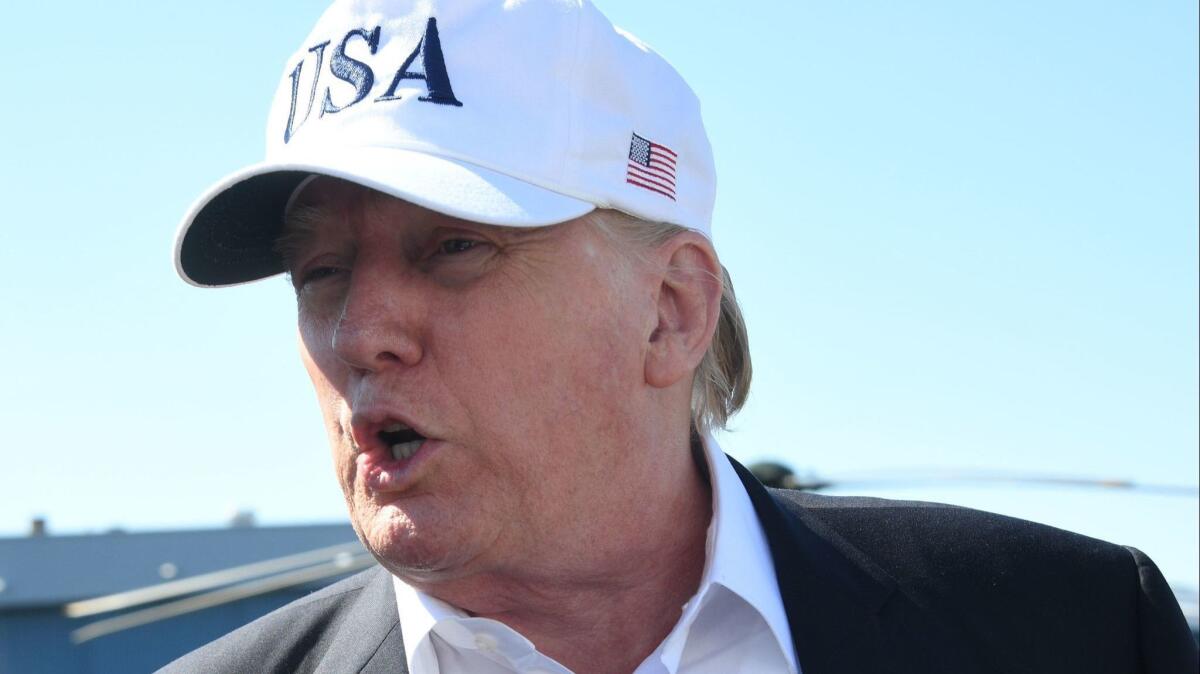Op-Ed: Trump’s anti-NATO hostility isn’t novel, it revives a long-standing Republican tradition

In the new superhero movie “Incredibles 2,” the baby, Jack-Jack, freaks out his family when he morphs into a destructive demon. NATO members who are on the receiving end of Donald Trump’s blasts as he prepares for a summit in Brussels — “we’re schmucks for paying for the whole thing” — seem to view the president with similar emotions.
Trump’s jabs about defense spending, immigration and trade already have prompted thousands to protest against him in Brussels. The president of Germany’s Federal Academy for Security Policy, Karl-Heinz Kamp, observed that members of the 29-nation alliance must now realize they are dealing with an “unpredictable and obviously mentally impaired American president.”
But from a historical perspective, Trump’s hostility toward NATO should hardly come as a shock. His language is intemperate, but it’s also reminiscent of the deep skepticism toward liberal internationalism long championed by many in the Republican Party.
The first portent of the GOP’s opposition to international organizations came with the debate over the League of Nations, when Woodrow Wilson championed American entry in 1919. Wilson’s crusade was defeated by Republican Sen. Henry Cabot Lodge, who led a faction known as the irreconcilables. They based their opposition on Article 10 of the treaty, which called for the defense of a member that experienced external aggression. Lodge argued that Article 10 would subordinate the U.S. military to the whims of an international organization, thereby eviscerating the constitutional role of Congress in formally declaring war.
Trump’s language is...reminiscent of the deep skepticism toward liberal internationalism long championed by many in the Republican Party.
Lodge, who also played a key role in promoting legislation drastically restricting immigration to America, said that he was for — you guessed it — America first: “I can never be anything else but an American, and I must think of the United States first, and when I think of the United States first in an arrangement like this, I am thinking of what is best for the world.”
The original America First movement began as a liberal endeavor at Yale University, advocated by students who wanted to avoid a repetition of the insensate slaughter of the innocent during World War I. But it was quickly hijacked by the right. Almost overnight it curdled into an anti-Semitic, isolationist organization.
Republicans didn’t specifically endorse isolationism, but the party was steeped in it. Two of its foreign policy heavyweights, Henry Stimson and Frank Knox, were ousted at the June 1940 GOP convention in Philadelphia for the apostasy of serving in the Roosevelt administration. That month the Republican oracle, the Wall Street Journal, demanded “realism” toward Nazi Germany, which, it decreed, had “already determined the broad lines of our national life for at least another generation.”
After World War II, NATO itself was anathema to mossback Republicans. Once again, Republican senators were transfixed by the military implications. Sen. Robert Taft — known as “Mr. Republican” — voted against joining the alliance in 1949. He argued that by encircling Russia, NATO would create a self-fulfilling prophecy of war with the then-Soviet Union. The United States, he said, could not afford to become a Sir Galahad protecting the rest of the world.
Taft sounded more diplomatic than Trump does, but his position wasn’t far from a White House tweet: “We cannot adopt a foreign policy which gives away all of our people’s earnings or imposes such a tremendous burden on the individual American as, in effect, to destroy his incentive and his ability to increase production and productivity and his standard of living.”
Enter the Fray: First takes on the news of the minute from L.A. Times Opinion »
Others shared Taft’s opposition to alliances in Europe. His Republican colleague Forrest C. Donnell set off a “land mine” at the time, according to then-Secretary of State Dean Acheson in his memoir “Present at the Creation.” Donnell went into a lather about Article V of the NATO charter, much as Trump does today. It calls upon member states to come to the assistance of the others if attacked, the very issue on which American membership in the League of Nations faltered. With Soviet aggression palpably obvious in Eastern Europe, President Truman quashed the budding debate over the implications of the clause.
Even during the Cold War, the right never jettisoned its suspicion of liberal internationalism. Organizations such as the United Nations, the Trilateral Commission and the Council on Foreign Relations were depicted in the right-wing press as nefarious cabals intent on subverting American sovereignty and independence to create a Marxist-led world government. A direct line can be drawn from these conspiracy theories to Trump’s bluster about a deep state subverting his presidency and undermining the will of the American people.
The difference is that in the years after World War II and through the Cold War, Republican presidents from Dwight Eisenhower to George H.W. Bush firmly relegated the conspiracy theorists and the foes of international alliances to the fringes of the party. Trump’s administration has made them mainstream. Once revived — and nurtured — these demons from the past will not be easy to exorcise.
Jacob Heilbrunn is the editor of the National Interest. @JacobHeilbrunn
Follow the Opinion section on Twitter @latimesopinion and Facebook.
More to Read
A cure for the common opinion
Get thought-provoking perspectives with our weekly newsletter.
You may occasionally receive promotional content from the Los Angeles Times.










